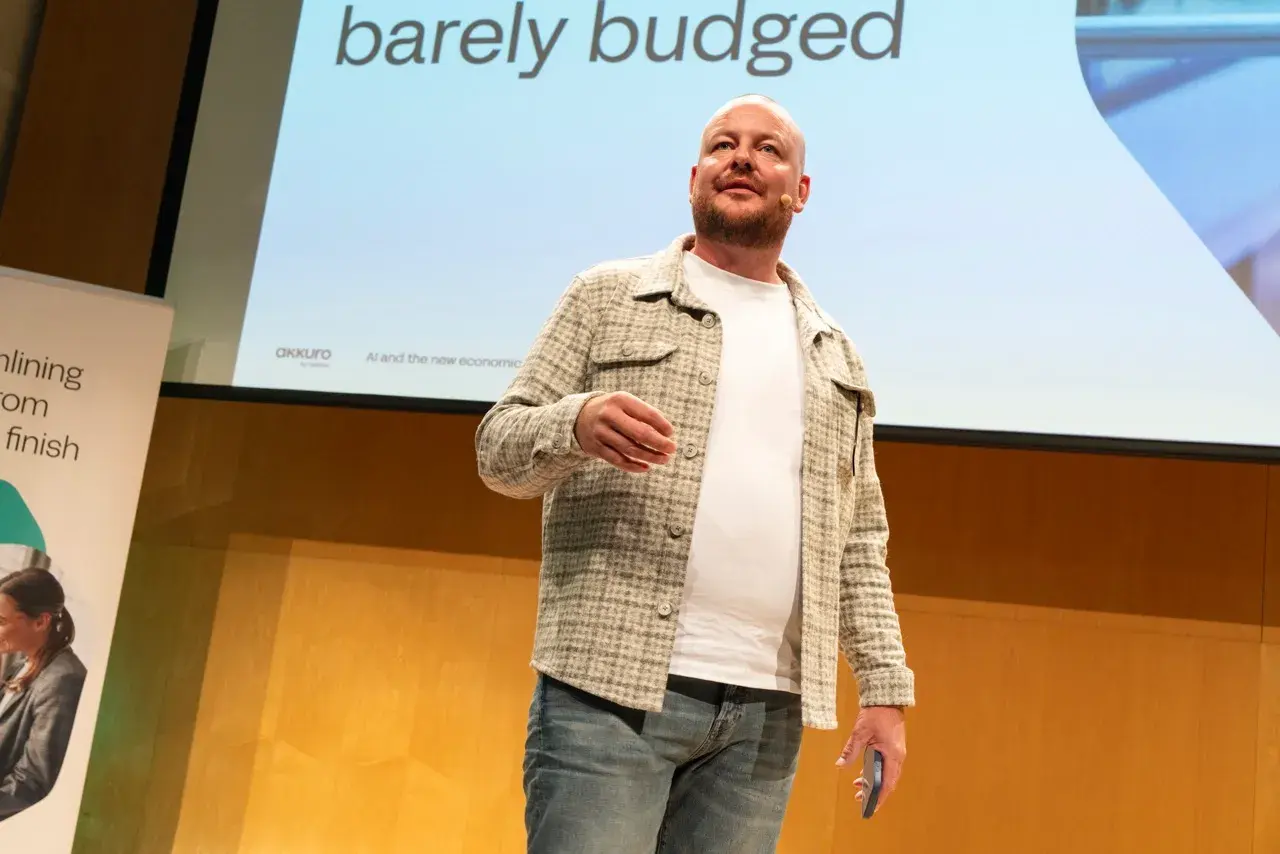Redefining banking at Amsterdam Fintech Event 2025


Summary
At the Amsterdam Fintech Event 2025 we showed how AI is becoming a real economic lever for banking. Jamie Burink’s keynote and our live demo of Kuro proved that efficiency is no longer the goal, it’s the baseline. The real shift is in capability where AI helps banks build, decide and design smarter. Banks that use AI as a cost lever will keep up. Those that use it as a capability lever will lead.
At the 2025 Amsterdam Fintech Event, hundreds of leaders from banks, fintechs and technology firms gathered to explore how AI is reshaping financial services. The focus was clear: faster innovation, smarter systems and a new balance between efficiency and control.
We joined this year’s event to show something real in action: how agentic AI turns banking intelligence into an economic lever. From Kamuno’s AI-driven lending to Kuro’s live product design demo, we proved that the next phase of transformation isn’t about replatforming or replacing teams, it’s about building capability that moves as fast as the market.
The keynote: AI as a new economic lever
Jamie Burink opened with a paradox every banker recognizes. Customers want faster, simpler banking while risk and regulation pull in the opposite direction. Cost-to-serve has hardly moved in a decade but expectations have exploded.
His keynote framed AI not as a productivity tool but as an economic lever that changes the fundamentals of cost, capability and control.
Through three lenses, Efficiency, Capability and Vision, the session showed what’s already real, what’s emerging and what’s next.
Efficiency: the measurable now
Using the real world case of Kamuno, a Swiss fintech initiative backed by Urner Kantonalbank, Jamie showed how automation in loan origination cuts turnaround time and cost without compromising accuracy. In a world where AI in compliance and KYC can already lower cost-to-serve by 50%, efficiency is no longer a differentiator. It’s table stakes.
Capability: the new possible
Kuro, a conversational agent for product development and design, showed how banks can go from idea to product in days instead of months. The live demo proved it. Instead of waiting on IT bottlenecks, teams can prototype and test ideas instantly. Together with the audience, we built a a new lending product for the Chinese market in seconds!
Vision: rethinking the model
The final lens looked forward. Jamie outlined a world where lending becomes objective-driven rather than process-driven. Instead of coding workflows, banks set outcomes like “produce a compliant loan decision” and AI agents coordinate dynamically to reach it.
The implications are profound: flexible systems, lower structural costs and smarter customer interactions.
 Jamie Burink giving his keynote at the Amsterdam Fintech Event 2025
Jamie Burink giving his keynote at the Amsterdam Fintech Event 2025
The panel: where efficiency meets strategy
After the keynote, we hosted a panel that brought the discussion to the floor.
We were pleased to welcome a panel of experts who brought deep experience from across the financial and technology sectors. A big thank you to our guests:
- Sebastiaan Bekker, CTO, MyWheels
- Jane Zavalishina, Chairman of the Supervisory board, FINOM Payments
- Paula Steiner, Chief Compliance Officer, Fiat Republic
- Karen Clarke-Hamers, Chief Architect, COFRA Holdings
- Sandeep Gangaram Panday, Security Advisor, Brightlyn
Moderated by Eric Euwes and Frank Schooneveldt, the conversation challenged participants to weigh AI’s promise against its practical realities:
- How much risk should banks accept upfront?
- When does explainability outweigh accuracy?
- Are efficiency gains masking missed opportunities for strategic change?
The discussion echoed a key theme: efficiency matters but it’s not strategy. Banks that focus only on ROI risk missing the bigger transformation ahead. Left to right: Karen Clarke-Hamers, Jane Zavalishina, Sandeep Gangaram Panday, Paula Steiner and Sebastiaan Bekker
Left to right: Karen Clarke-Hamers, Jane Zavalishina, Sandeep Gangaram Panday, Paula Steiner and Sebastiaan Bekker

- Technology
Building a brain for banks
Agentic Banking is built on a foundational shift: systems no longer just execute logic, they express intelligence.
"It was great mixture of banks and Fintech of the Netherlands. I loved the entrepreneurial vibe and the open discussions on regulatory pressure, Agentic AI and tokenization. The closing drinks proved that the Dutch Fintech eco-system is alive and prosperous."

Closing AFE: fintech meets reality over drinks
We were also proud to sponsor the networking drinks that closed the event, a fitting setting for a day centered on human and machine collaboration. As attendees debated the future of agentic banking, one message resonated: AI will not replace judgment but it will redefine how judgment is applied.
AI in banking isn’t about doing the same things faster. It’s about doing fundamentally different things. From automated lending to conversational product design, the shift is already underway.
Banks that see AI as a cost lever will survive. Those that see it as a capability lever will lead.

Eric Euwes giving the closing speech at AFE
Let’s continue the conversation!
We met people at AFE who are challenging what banking can be. If you’re looking to reinvent how you serve customers, design products or build smarter systems, let’s connect.
See Kuro in action, schedule a 30-minute conversation with our team or stay tuned with our latest insights.

- News
Akkuro powers Kamuno’s mission to set a new benchmark for SME lending in Switzerland
Kamuno, a Swiss fintech initiative backed by Urner Kantonalbank (UKB), is simplifying access to finance for small...
Get in touch!
Do you want to hear more about our Composable Banking Platform or about our agentic AI? Submit your details and our team will get in touch with you!




